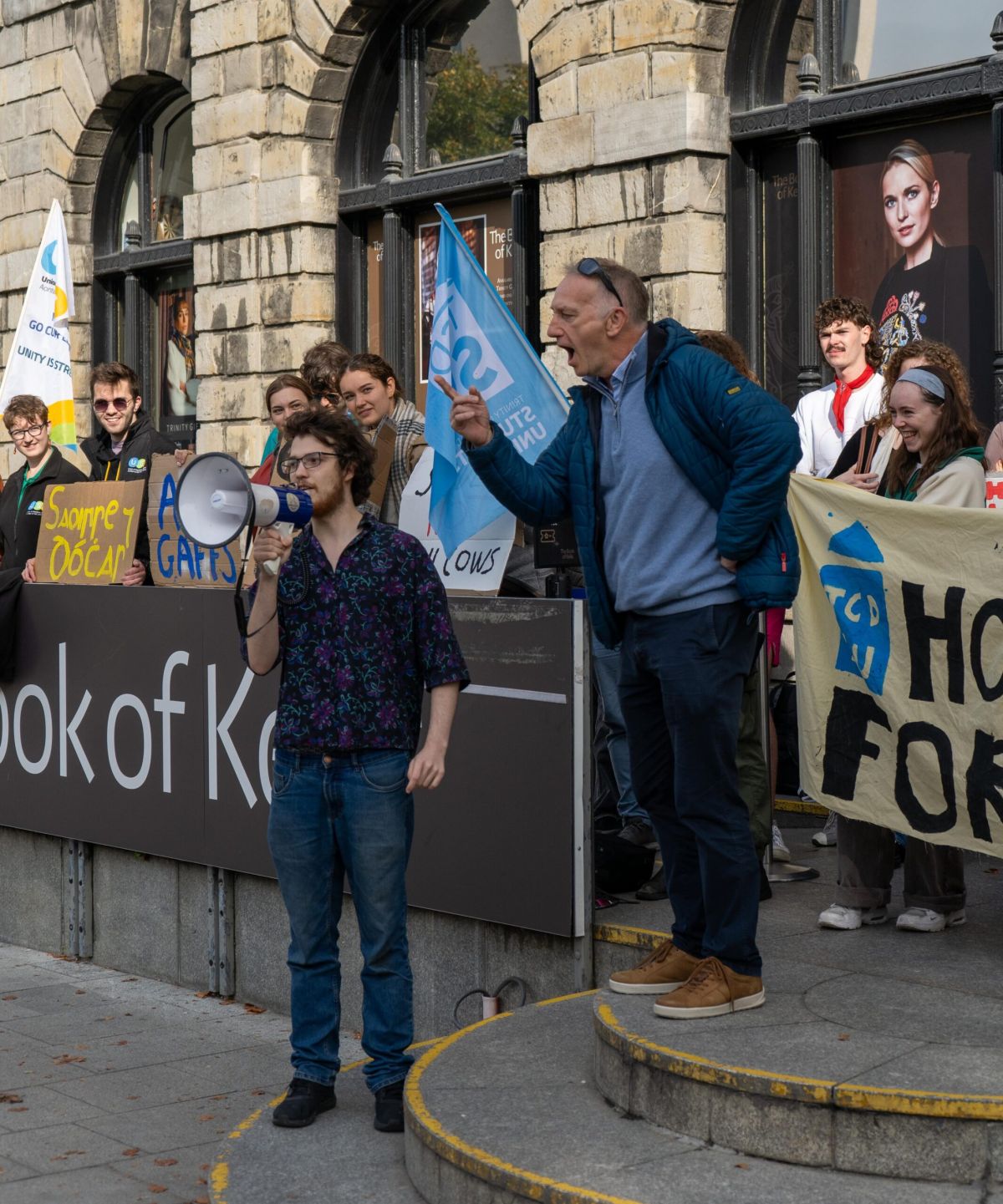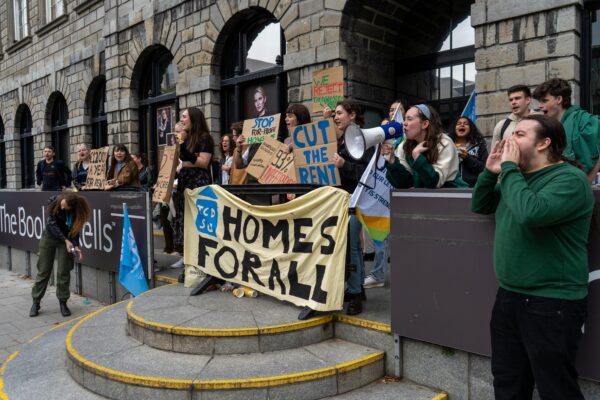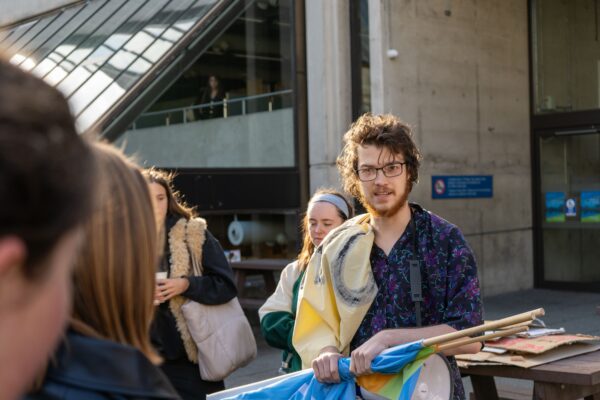“Manchester inspired the movement here”: The Students’ Union President making headlines in Dublin
By Lúcás Rohan

Trinity College Dublin (TCD) is one of the world’s oldest and most storied universities, and much of Ireland’s political and literary elite has passed through its halls. Located in the heart of Dublin City, it has also become a buzzing tourist destination, no doubt helped in this regard by its role as Connell and Marianne’s alma mater in Sally Rooney’s ‘Normal People’.
The throngs of tourists that visit the college daily are largely headed to one destination: Trinity’s permanent exhibit of the Book of Kells, a priceless manuscript written well over 1000 years ago that contains the Gospels of the New Testament. At €18.50 (£16) a ticket, entry isn’t cheap, and yet over half a million visitors every year visit what TCD brands as “Ireland’s greatest cultural treasure”.
On September 13, however, those wishing to view the Book of Kells were consigned to the reliable drizzle of Dublin, as several dozen protestors blockaded the entrance to the exhibit. Led by the newly-elected president of the Students’ Union, László Molnárfi, the group carried signs reading “Students not cash cows” and “Homes for all”, preventing entrance to the exhibit until its time of closing.
The impetus for the protest was an announcement by TCD of a 2% rise in rents for campus accommodation, despite an acute housing crisis in Dublin that has led to record levels of homelessness. The thinking in response to the University’s decision was made clear in a statement from the Students’ Union: “If they take money from the students, then the students will take money from college, by blockading one of Trinity’s most profitable attractions.”
Some simple maths with the aforementioned ticket prices would suggest such action is likely costing TCD daily, with the attraction bringing in an estimated 1 million visitors a year. Molnárfi claims that the direct action cost the college €60,000 at the very least, with the figure potentially being as high as €100,000.
The Dean of Students, Richie Porter, responded to TDC’s student paper Trinity News that the protestors were “biting the hand that feeds them.” Another University spokeswoman told to The Irish Times that the protest was “counterproductive”, and “actions [like the blockade] only worsen the situation for everyone.” The blockade did not continue the following day, but Molnárfi remained President of the SU. On October 26, Trinity College confirmed that they would no longer be raising rents, and would agree to the 2024-25 rent freeze that the protestors proposed.

In Conversation with TCDSU President Molnárfi
The TCD Students’ Union President’s office is closer to resembling the front of a socialist rally than a managerial workstation. One imagines that that is the point. Antifa posters, Palestinian flags, and various leftist memorabilia adorn the walls, and the only available white space is scrawled over in black marker: “SOLIDARITY FOREVER”. The redecorator, current SU president László Molnárfi, has been involved with radical politics since the first day he arrived in Ireland in September 2020.
Born in Hungary but raised in Brussels by parents working for the EU Commission, Molnárfi was motivated to join Community Action Tenants Union (CATU), a renters’ union, after speaking with a homeless student on his first day in Dublin. Soon thereafter he entered the world of Trinity College politics as a representative for his course in the Students’ Union.
Three months after his arrival in Dublin, Molnarfi founded an “explicitly socialist” action group, Students4Change, to place pressure on the Students’ Union. He is asked how many others joined him in the founding of the group. “It was just me. I made a website so it looked like there were more people,” he says, laughing.
The Students4Change group began to slowly grow, from an original base of 10 to 15 friends, to what is now over 100 members over several university campuses. As the pandemic continued to disrupt university life in 2020 and 2021, Molnárfi says he took close notice of the protest movements gaining momentum at the University of Manchester.
“Manchester caught my eye, with the rent strikes and protests that were going on – I thought it was simply wonderful how students stood up to a corporatised university and to the disrespect shown (during COVID-19).” He goes on, adding that “when you tore down that fence… All of that was organised by grassroots groups, not by Students’ Unions. That essentially inspired the movement here.”
When asked about his take on the University’s response to last year’s crop of rent strike activists, Molnárfi is forthright. “It’s absolutely disgraceful. The heavy-handed evictions… it really shows that our universities have become complicit in protecting capital”.
“Once a student movement grows enough to actually threaten capitalism, the state will come down in a heavy-handed manner, and our universities will suddenly abandon their nonsense talk about diversity, inclusion, equality… all that liberal PR”.
“That’s a shame really, because universities are supposed to be a place where you challenge the existing order.”
Molnárfi continued to serve in roles in the Students’ Union in his second and third years at university. By his own account, though, he was “not liked at all” when he first was elected to a position in the union.
“That’s when I first discovered how a lot of people in Ireland don’t like confrontation… they don’t like activism or direct action that much.” He clarifies this quickly, noting that “we as Marxists have to be careful not to attribute these things to: ‘that’s just the way that people are’.” It’s not a general passivity, Molnarfi says, but an attitude created by neoliberal capitalism that has co-opted Students’ Unions.
Molnárfi argued at several points in this interview that the Students’ Union in Trinity College is for many a mere bullet point on the resumé in Dublin’s competitive social hierarchy. He notes that “[Students’ Unions] seem to forget who they’re representing.”
In March of this year, Molnárfi swept to a landslide victory for the role of president in the Students’ Union, gathering 56.7% of the vote. The next closest candidate garnered just 20%. When asked why he thought he won by such a margin, Molnárfi was buoyant.
“Students’ Union candidates campaign thinking that the way you win is by convincing the 150 people already in the Students’ Union. I won simply by doing what every sabbatical candidate should do: I campaigned to students!”. He continued, saying “I’m not respectable, I’m a student myself, and I’m not a negotiator between college and students; I just represent students.”
Molnárfi answered many questions regarding his political outlook by lamenting the grip that he feels liberal political thinking has over the Students’ Union. “Liberals”, he says, “speak out against inequality very strongly, but no action”. With his Marxist philosophy, “I have, I think, a correct analysis of how these power structures work and how the profit motive works, in the university. I know that the only way we can actually effect change is through direct action”. On this point Molnárfi is somewhat bullish. “None of the things in my manifesto actually need the consent of the provost”, he argues.
Such fighting talk is effective, one can imagine, when campaigning against those running the Students’ Union. But how does he manage to work side-by-side with the Trinity leadership now that he’s been elected?
“They really don’t like me”, he admits. He says senior management accused him of being anti-democratic and dictatorial in the wake of the Book of Kells blockade. “Look, they bring you in on the first day, ‘here’s some coffee, we’ll be great friends’ – I wasn’t under any illusions, but others are”, he says.
“To me, it’s like a trade union [and] they find that really difficult to deal with because it’s the first time there’s been a movement that is more radical, more outspoken.”
When asked if he’s worried about the possibility of impeachment, Molnárfi is relatively breezy. “The constitution says that we have to be apolitical, and that’s grounds for impeachment. But no one will do it because our faction has a lot of support”, he says with confidence. “If they do, it will expose the nature of the Students’ Union.”
The revolutionary spirit in the offices of the Students’ Union hasn’t gone unnoticed among students and the Irish public at large. The blockade of the Book of Kells was covered by every major news outlet in the country, and Molnárfi has become a frequent point of conversation among Trinity college students.
One fourth-year English student who attended the Book of Kells blockade is staunch in her support, and argues that “the outcomes he’s asking for aren’t even that radical.” Rather, Trinity “has a culture of privilege”, and “the only reason [Molnárfi] gets criticised the way he does is because it’s radical here to even ask [for change] at all.”
Molnárfi added that the aversion to protest “is ironic given the history of this place,” but “when it comes to issues like housing, the attitude is very much ‘calm down, it’s not a big deal’, but like, it’s a huge deal!”

A conversation with a former Students’ Union sub-officer, on the other hand, illuminated the opposing argument: “The Students’ Union in Trinity, you have to really understand,” he begins, “this thing is an institution!”
The former sub-officer claims that the last few years have been “very stable”, and that Molnárfi “just wants to shake up the room”. While the fourth-year blockader told The Mancunion that Molnárfi was “doing something revolutionary with the Students’ Union”, the former sub-officer argued that “electing (Molnárfi) was a bit of a meme – no one’s elected him for his policies!” He additionally complained about Molnárfi’s stance on Irish politics, claiming that while “of course [Molnárfi] can talk about Ireland…there’s a bit of cultural insensitivity”.
However, the fourth-year blockader refers to somewhat of a “boys club” existing at Trinity among Dublin-born students in particular, and that some of the criticism levelled at Molnárfi “seems like a thing against outsiders.” For example “the blockade,” she says, “was about rent on campus”, and “the only people renting on campus are people who don’t live in Dublin”.
A lot of the criticism levelled at Molnárfi, she claims, comes from those who “don’t necessarily even experience these issues” because they reside in family homes in Dublin.
Still, the former sub-officer maintains that some students’ issues with Molnárfi go beyond this. “From what I can see on the outside, from people I’ve talked to, it seems like it’s his way or the highway”, he says. “It’s almost like he’s got an ‘I know best’ policy about everything”.
“Some people love him, and some people don’t – he’s like Marmite”, concedes the fourth-year blockader The Mancunion spoke with. Still, she says, after the Book of Kells protest, he held a meeting about further action, and “everyone was invited – he asked them, ‘how do we protest, what’s the next move for us?’ – that was just brilliant in terms of political leadership.”
Molnárfi himself is aware of the hostility that could arise by the sudden ascendance of a communist to the Students’ Union presidency of Ireland’s most prestigious college. Nevertheless, “I don’t play respectability politics”, he says, even though it’s “so ingrained in Irish politics and in the student movement”. Once again, Molnárfi’s outlook is bullishly confident. “Students definitely support our faction over the hacks, the bureaucrats, and the moderates…I know it sounds harsh but it’s the truth!” “I’m very happy”, he says, “to say that yes, I’m far-left, that’s my faction!”
As for the future, Molnárfi says that he is “testing the waters at the moment”. He admits that the Book of Kells blockade only lasted one day primarily because “I don’t think we would have had the energy to keep it up”. Still, he believes the student body has a strong appetite for more direct action, and the occupation of derelict buildings in Dublin as well as a potential rent strike are protest methods he says are being considered.
While the rent freeze that was demanded during the blockade remains a priority, Molnárfi notes that it’s not “the be-all and end-all”. The overall aim, then, is to “politicise the student body and have it shift in a left-wing direction really quickly, like what happened with May 68”, he says, making reference to the 1968 protests in France that nearly toppled the national government.
Certainly optimistic. Still, with a debilitating housing and cost-of-living crisis continuing to bite, and a potentially seismic general election on the horizon, Irish politics is in many ways on the brink, edging towards a deeply uncertain future. There may well be an appetite for radical politics. And while the student revolution Molnárfi is hoping for hasn’t quite yet materialised, the next year at Trinity College Dublin is unlikely to be a quiet one.
A Trinity College Dublin spokesperson referred The Mancunion to a statement issued on the day of the blockade:
“This 2 per cent increase was part of a three-year plan that will expire this year and will be subject to review. Utility charges for students have not been increased at all this year despite significant inflation pressure. We are always open to engaging with the student body on discussing rents for future years. Students have every right to protest peacefully and we are always willing to listen to their views and engage in dialogue. However, blocking the entrance to the Old Library of Trinity College Dublin, which holds the Book of Kells, is counter-productive. Income from the Book of Kells exhibition is vital for running the university and for providing services to students. Actions like today’s blockade only worsen the situation for everyone.”







